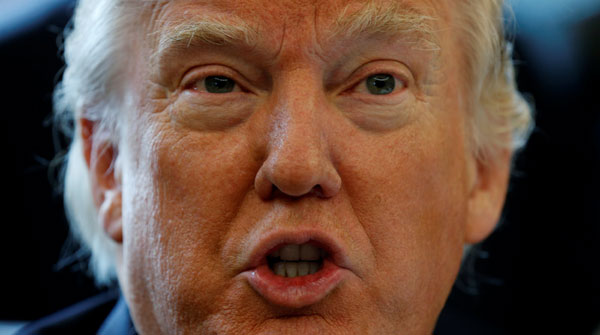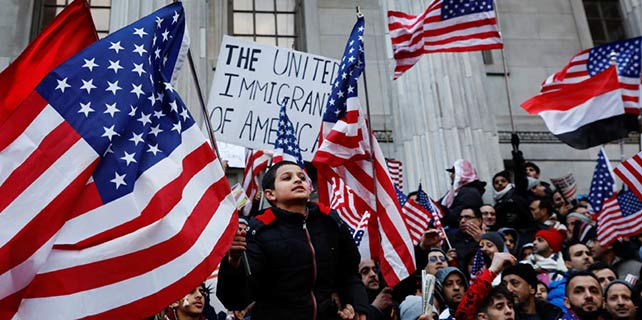Trump's policies divide US, allies
 |
|
US President Donald Trump speaks while signing executive orders at the White House in Washington January 24, 2017. [Photo/Agencies] |
Since being sworn into power, US President Donald Trump has been quickly and firmly implementing his campaign promises. He has not only ordered an immediate withdrawal of the United States from the Trans-Pacific Partnership agreement, but also issued a travel ban against the citizens of seven Muslim countries, and signed an executive order for a wall to be built along the US-Mexico border. During a phone call with Australian Prime Minister Malcolm Turnbull, he even ridiculed a refugee agreement reached between the US and Australia under the Barack Obama administration, and reportedly ended the call abruptly.
While Trump has promised a "new deal" in the first 100 days of presidency, he has already caused much damage in his first 10 days, threatening the core checks-and-balances of US democracy. To retaliate against his travel ban, Americans nationwide are protesting against Trump's radical move. The Senate minority leader Charles Schumer has called such a travel ban very "un-American" and San Francisco and Washington State have launched lawsuits against the president. More than 900US diplomats have officially lodged their dissent, saying that "such a ban will bring more harm to the US than otherwise." The United Nations has also expressed its concern over such a ban. Breaking American tradition not to comment on the present president, former president Obama has just spoken out to defend America's "core value".
Trump has not only hurt US relations with the Muslim world, he has also upset the US' friends and allies. His disrespect of Australia has invited dissatisfaction from Canberra. His claim that Germany has been "tapping the weak euro" so as to exploit its trade partners, and his comment on Japan's currency manipulation, have upset these major allies. And more than a million people in the United Kingdom have voiced their opposition to the UK government inviting Trump to visit, and Mexican President Enrique PeñaNieto has decided to cancel his visit to the US.
Even in his own country, Trump has shown no interest in mending the rifts he is creating. Millions of women have already staged demonstrations throughout America. Trump's tolerance of the extreme alt-right, the new white supremacy movement, has ignited students' open opposition at UC Berkeley. The Democrats are opposed to Trump's pick for Supreme Court Judge to NeilM. Gorsuch and are pushing for his nomination to be refused.
Actually in eight days, Trump has managed to make his public approval rating lower than his disapproval rating, setting a record. He may still think all he has done is to put "America first", but to attain greatness by denying people and the US partners' legitimate rights will hardly generate sustainable acceptance of American leadership.
In the face of the counter pressure, Trump's team is reluctantly making adjustments. Thus far the White House has allowed some 900 of green-card holders from the aforementioned seven Muslim countries to return to the US. It has watered down its enforcement of the travel ban, and argued that such a ban is not targeted at all Muslims. No one would reject Trump's professed purpose of preventing terrorists from entering the US, but most disagree with his simplistic, disruptive and discriminative immigration policy.
Until now, Trump has refrained from pushing the envelope on China. But in light of his actions over the past two weeks, it is better for Beijing to take Trump's campaign threats seriously. However, just as his impulsive self-isolationist approach is distancing the US from its allies, any unfair handling of China-US relations will only alienate the US even more from the world. Remembering that the travel ban has been so unreasonable for the US permanent residents of those Muslim countries from returning, the Trump administration should be mindful that any unilateral, non-cooperative approach to China would only make it "ride a tiger but find it difficult to get off".
Trump has, time and again, professed he wants to conduct fair deals. China welcomes fair business, but it is also against unfair deals.
The author is professor and associate dean of Institute of International Studies, Fudan University.






















